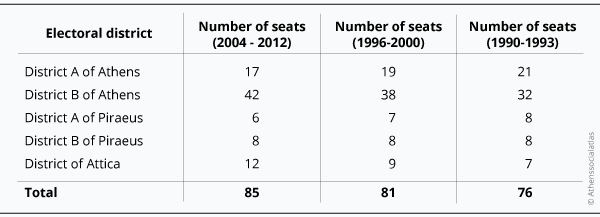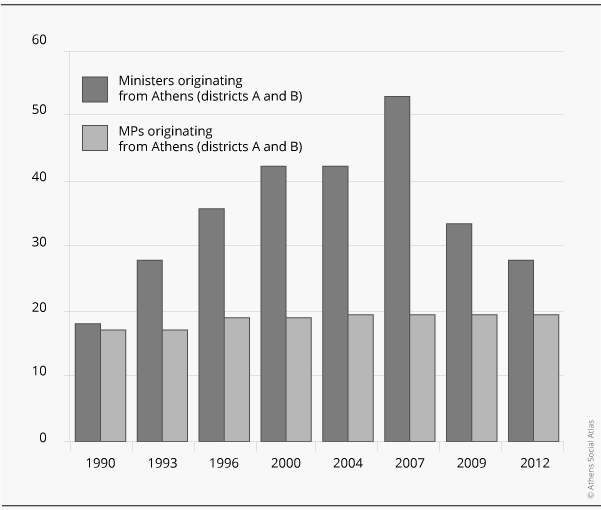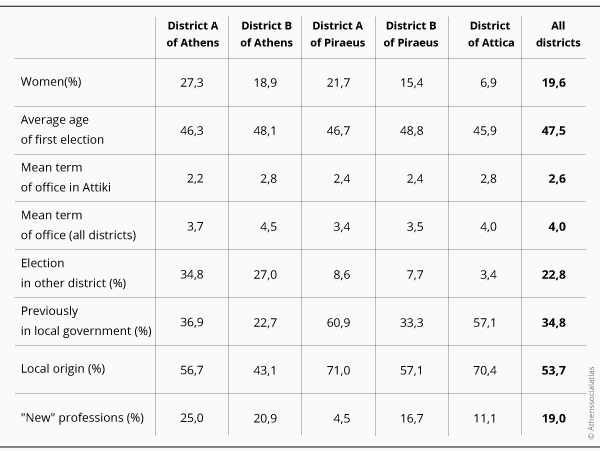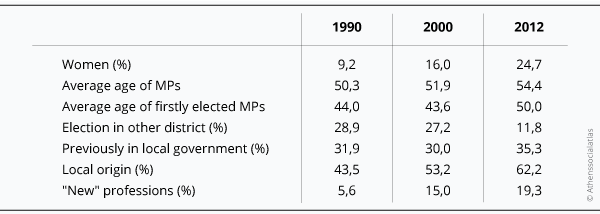Members of Parliament in Attica, 1990-2012. Social and political characteristics
2015 | Dec
The geographical region of Attica is divided in five electoral districts, which in total elect 85 MPs. Among them is the largest electoral district in the country, ‘Athens B’, which elects 42 MPs.
Table 1: Number of MPs elected in the region of Attica
In the period between 1990-2012 nine national elections were held, in 1990, 1993, 1996, 2000, 2004, 2007, 2009, and in May and June 2012 [1]. Overall, in 1990-2012, these five electoral districts elected 255 MPs, with an average of 4 office terms for each MP (Table 2). A first key finding is that these five constituencies have substantial internal differentiations reflected in the political profiles of the MPs elected. Fierce competition, the difficulty of being elected in Athens A and B, as well as the symbolic significance of being elected in these two central constituencies, to a large extent differentiate them from the rest. Over time, 25.8% of MPs elected in Athens A and 18.9% in Athens B had been previously elected in another electoral district, thus manifesting that for some members of Parliament, being elected in these constituencies is deemed as the “climax” of a political career that has started in smaller constituencies of the periphery. Another parameter that supports this finding is the overrepresentation of MPs elected in Athens A and B in the composition of Governments (see Table 2). From 1993 to 2012, the gap between the parliamentary representation of these constituencies (i.e. the percentage of parliamentary seats of Athens A and B in the total of 300 parliamentary seats) and the presence of these MPs as ministers in Government [2] is clear, while in the period 2000-2007, the difference is even more pronounced.
Figure 1: Ministers and MPs elected in Athens A and B, out of the total of Ministers of Governments and of the total of MPs respectively (%)
Table 2 shows some further characteristics. An important parameter that differentiates MPs is that of their profession: certain professions (we call them “new professions”) associated with the Media and show business, such as journalism or artistic and sport professions, are overrepresented in Athens A and B, compared to the other electoral districts of the Attica basin, as about one in four MPs elected in Athens A and one in five MPs elected in Athens B come from the above professional fields. Experience in local government seems to be more important in the smaller electoral districts of the Attica basin, since about six out of 10 MPs in both Piraeus A and the electoral district of Attica have served in local government, manifesting the establishment of previous ties with the community. The issue of ties with the local community is also measured through the locality or non-locality of the elected MPs. MPs with the same place of birth and electoral district are defined as locals. Our findings suggest that especially in the largest electoral district of the country, Athens B, links to the electorate via locality are relatively weak.
Table 2: Characteristics of MPs in the constituency of Attica
Apart from the internal differentiations in the constituencies of Attica, as reflected in Table 2, we also detect changes in the socio-political profile of MPs over time; these changes reflect even more the political and social transformations of the last twenty years. By using the elections of 1990 as a starting point and the elections of 2012 as an endpoint, with the elections of 2000 as an intermediate moment (Table 3), we detect the following changes: a significant increase in the proportion of women, an increase in the mean age of first election of MPs, stability at first and then a small increase in engagement with local government, and lower percentages of previous elections in other districts. Regarding the professional profile, there is a clear rise in the so-called ‘new professions’. We could claim that the above indicate a tendency for the gradual “independence” of politicians from central party mechanisms, since in order to get elected, MPs activate personal communication channels with the electorate, either by strengthening their local ties or through the Media.
Table 3: Evolution of MPs’ characteristics in the five electoral districts of Attica (1990-2012)
[1] For the purposes of this text, we only refer to MPs elected in June 2012, without including data of the MPs of May 2012.
[2] The calculation was based on the original composition of the first governments formed after each election.
Entry citation
Kakepaki, M. (2015) Members of Parliament in Attica, 1990-2012. Social and political characteristics, in Maloutas T., Spyrellis S. (eds) Athens Social Atlas. Digital compendium of texts and visual material. URL: https://www.athenssocialatlas.gr/en/article/politicians/ , DOI: 10.17902/20971.42
Atlas citation
Maloutas T., Spyrellis S. (eds) (2015) Athens Social Atlas. Digital compendium of texts and visual material. URL: https://www.athenssocialatlas.gr/en/ , DOI: 10.17902/20971.9
References
- Κακεπάκη Μ (2015) Υπάρχει πολιτική χωρίς επαγγελματίες πολιτικούς; Μεταβολές και συνέχειες στα χαρακτηριστικά των μελών του Κοινοβουλίου, 1996-2015. Στο: Γεωργαράκης ΝΓ και Δεμερτζής Ν (επιμ.), Το Πολιτικό Πορτραίτο της Ελλάδας. Κρίση και η Αποδόμηση του Πολιτικού, Αθήνα: Gutenberg, EKKE, σσ 168–187.




